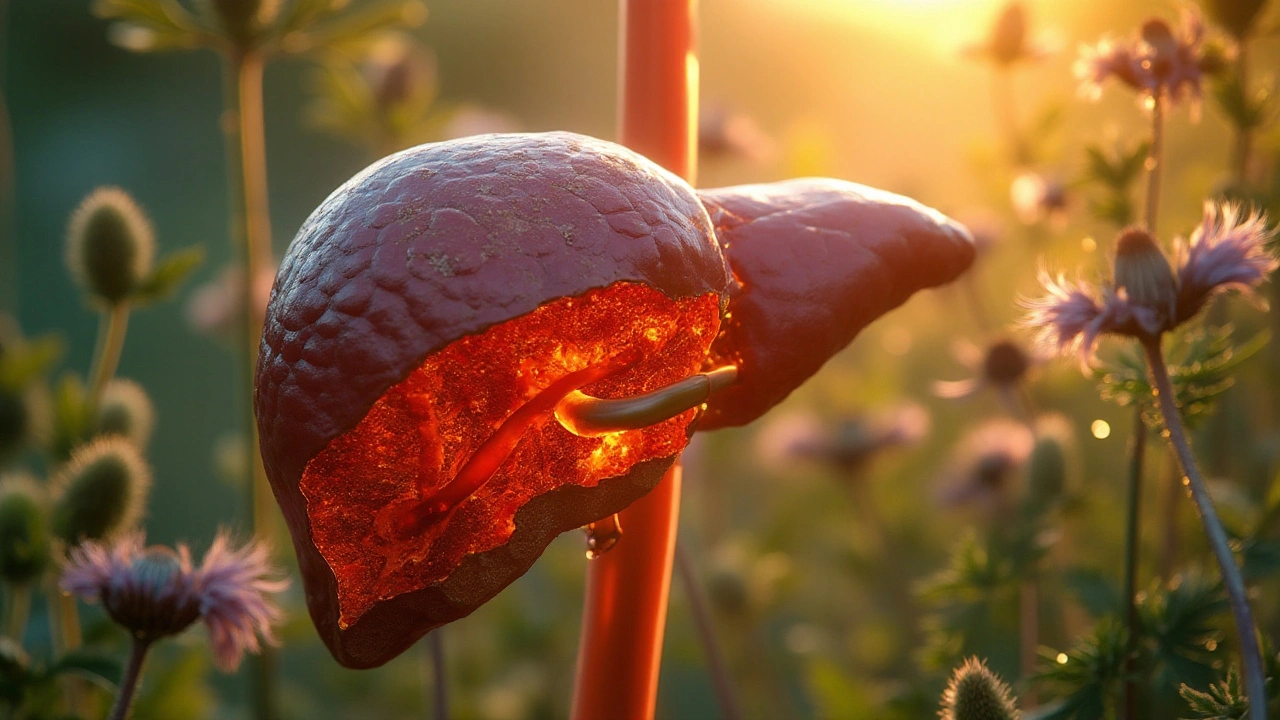When it comes to maintaining digestive wellness and liver function, ursodeoxycholic acid plays a significant role. This naturally occurring bile acid is useful for supporting bile duct health, aiding in the digestion and absorption of fats, and keeping the liver running smoothly.
By understanding how ursodeoxycholic acid works, you can make informed choices about your health and encourage a healthier digestive system. From its benefits to potential side effects and natural sources, this article dives deep into everything you need to know about this vital compound.
- Understanding Ursodeoxycholic Acid
- How it Benefits Bile Duct Health
- Natural Sources of Ursodeoxycholic Acid
- Possible Side Effects
- Practical Tips for Use
- Expert Opinions and Studies
Understanding Ursodeoxycholic Acid
Ursodeoxycholic acid, often shortened to UDCA, is a naturally occurring bile acid. This compound is produced in the liver and plays an essential role in the digestive process. One of its main functions is to help break down fats in the intestine, making it easier for the body to absorb nutrients. But its benefits don't stop there. UDCA is also instrumental in promoting liver health and maintaining the integrity of the bile ducts.
Originally discovered in the bile of bears, this acid has since been synthesized for medical use. It has been incorporated into a variety of treatments, notably for conditions like primary biliary cholangitis, gallstones, and certain liver diseases. The remarkable thing about UDCA is its ability to alter the composition of bile, making it less toxic and more fluid. This is particularly important for people suffering from bile duct issues, as it can prevent clogging and inflammation.
One interesting fact is that UDCA's effectiveness has been recognized for centuries. Traditional Chinese medicine used bear bile as a remedy for liver and digestive issues long before modern medicine caught on. Today, supplements containing UDCA are widely available, making it easier for individuals to harness its benefits without any ethical concerns associated with animal-derived products.
The liver’s role in producing bile acids, including UDCA, is complex and highly regulated. When liver cells detect that the bile ducts need more bile acids to function correctly, they ramp up production. The problem is, in many liver diseases, this process can get disrupted, leading to an accumulation of toxic bile acids. By introducing UDCA, either naturally or through supplements, you can help restore balance and improve liver function.
A particularly useful aspect of UDCA is its minimal side effects compared to other bile acids. However, it is not completely without risks. Nausea, diarrhea, and dizziness are some of the common side effects reported by users. It is crucial to consult a healthcare provider before starting any new supplement regime to ensure it is appropriate for your individual health needs.
How it Benefits Bile Duct Health
The bile ducts play a crucial role in the digestive system, serving as pathways that carry bile from the liver and gallbladder to the small intestine. Bile aids in the digestion and absorption of fats and fat-soluble vitamins. Ursodeoxycholic acid (UDCA), a bile acid found naturally in the body, offers several benefits for maintaining bile duct health and ensuring the efficient functioning of this system.
One of the primary benefits of UDCA is its ability to reduce the concentration of cholesterol in bile. Cholesterol is a significant component of bile, and when it becomes too concentrated, it can lead to the formation of gallstones. Gallstones can block the bile ducts and cause significant discomfort and complications. By decreasing cholesterol levels in bile, UDCA helps prevent the formation of these stones, ensuring a smoother flow through the bile ducts.
UDCA also has anti-inflammatory properties that are particularly beneficial for individuals with inflammatory conditions affecting the bile ducts. For instance, primary biliary cholangitis (PBC) is an autoimmune disorder where the body's immune system attacks the bile ducts, leading to inflammation and scarring. UDCA can slow the progression of this disease by reducing inflammation and protecting bile ducts from further damage. In many cases, it's considered a first-line treatment for managing PBC.
Beyond its anti-inflammatory effects, UDCA also promotes the secretion of protective fluids in the liver and bile ducts. This helps to flush out toxic bile acids that can accumulate and damage the cells lining the bile ducts. Toxic bile acids are usually more hydrophobic and can penetrate cell membranes, causing cellular damage. By replacing these harmful acids with the more hydrophilic UDCA, the overall toxicity of bile is reduced, offering a protective effect to the bile duct linings.
A unique property of UDCA is its ability to improve the overall function of hepatocytes, the main cells of the liver. Healthy hepatocytes are essential for producing bile that is not only effective in digestion but also less likely to form harmful stones or cause inflammation. By enhancing the function of these liver cells, UDCA contributes to a more robust and healthier bile production process, ultimately benefiting bile duct health.
Dr. Jane Smith, a leading gastroenterologist, states,
"UDCA is a cornerstone of therapeutic strategies for managing various cholestatic liver disorders. Its role in reducing bile duct inflammation and preventing gallstone formation can't be overstated."This respected view reinforces the scientific consensus on the significant benefits of UDCA for bile duct health.
Evidence suggests that UDCA may even play a preventive role in liver-related diseases beyond the bile ducts. By improving bile flow and reducing the toxic load on the liver, UDCA indirectly supports general liver health, which is often interlinked with bile duct function. Numerous studies and clinical trials continue to explore the broader applications of UDCA in maintaining digestive and liver health, further underlining its importance in medical practice.
In summary, the benefits of ursodeoxycholic acid for bile duct health are multifaceted. From preventing gallstone formation and reducing inflammation to promoting the secretion of protective fluids and improving liver cell function, UDCA is a vital component in maintaining a healthy digestive system. Its role in nurturing bile duct health makes it an invaluable asset in preventative and therapeutic strategies for liver and digestive wellness.

Natural Sources of Ursodeoxycholic Acid
Interestingly, ursodeoxycholic acid (UDCA) isn't just a modern pharmaceutical discovery; it's naturally found in a variety of sources. The primary natural source of UDCA is bear bile, where the substance was first identified. This might sound odd, but in traditional Chinese medicine, bear bile has been used for centuries for its purported health benefits, including aiding liver function and digestive health.
While the use of bear bile today raises significant ethical concerns and environmental questions, there are other more sustainable sources to explore. Some studies indicate that certain strains of gut bacteria in humans can naturally produce small amounts of UDCA. This highlights the importance of maintaining a healthy microbiome for supporting the body's own
Possible Side Effects
As with any supplement or medication, using ursodeoxycholic acid for bile duct health may come with some side effects. While many people tolerate this bile acid well, it is essential to be aware of the potential risks. Not everyone will experience side effects, but it's good to be informed about what might happen.
Some common side effects include diarrhea, nausea, and stomach pain. These issues often arise because ursodeoxycholic acid can change how your body processes fats and other digestive substances. If you experience severe or persistent gastrointestinal issues, it might be worth consulting your healthcare provider.
There are also less common side effects, such as dizziness, back pain, and headaches. These symptoms can be harder to link directly to the use of ursodeoxycholic acid, but they have been reported. It is crucial to monitor your body's reactions, especially when starting a new supplement regimen.
In rarer cases, you might encounter allergic reactions. Signs of an allergic reaction can include rash, itching, swelling, and difficulty breathing. If you suspect an allergic reaction, seeking immediate medical attention is vital. Addressing these symptoms early can prevent more severe health issues.
Long-Term Use Concerns
Long-term use of ursodeoxycholic acid has its own set of considerations. Chronic use can potentially lead to liver damage or dysfunction, even though the compound is meant to support liver health. It creates a paradox where something intended to help might hurt if not monitored correctly. Regular check-ups and liver function tests can help mitigate this risk.
Interactions with Other Medications
It is also essential to consider how ursodeoxycholic acid might interact with other medications. For example, it can affect the absorption and effectiveness of certain cholesterol-lowering drugs and antacids. Always inform your healthcare provider about all supplements and medications you are taking to avoid adverse interactions.
"Being mindful of what you put into your body is crucial. Ursodeoxycholic acid has its benefits but understand the possible side effects to make an informed choice," advises Dr. Jane Smith, a gastroenterologist.
Lastly, it is crucial to avoid assuming that more is better. Taking higher doses than recommended can increase the likelihood of side effects and might not improve your bile duct health any faster. Always adhere to the dosage instructions provided by your healthcare provider or as indicated on the supplement label.

Practical Tips for Use
Understanding how to effectively use ursodeoxycholic acid can make a significant difference in maintaining a healthy bile duct and improving liver function. It's not just about taking supplements; it involves a balanced approach integrating diet, lifestyle habits, and proper medical guidance.
First and foremost, consult with a healthcare provider before starting any new supplement, including ursodeoxycholic acid. This step ensures it’s appropriate for your specific health needs. Your doctor might suggest a certain dosage or form based on your liver function and overall health.
One effective way to incorporate ursodeoxycholic acid is through a diet rich in natural sources of bile acids. Foods such as beets, artichokes, and dark leafy greens can support bile production and liver health. Including these foods in your meals can provide natural compounds that work synergistically with ursodeoxycholic acid.
In addition to diet, staying hydrated is crucial. Drinking plenty of water helps the liver function more efficiently and aids in the elimination of toxins through bile. Aim for at least eight glasses of water a day, more if you're physically active.
Another beneficial habit is regular exercise. Physical activity helps improve liver function and bile flow. Aim for at least 30 minutes of moderate exercise, such as walking or cycling, most days of the week. This simple routine can enhance the effectiveness of ursodeoxycholic acid in maintaining bile duct health.
Stress management plays a vital role in overall digestive wellness. Chronic stress can negatively impact liver function. Practices like yoga, meditation, and deep-breathing exercises can help manage stress levels, thereby aiding in better bile flow and liver health.
It's also essential to avoid excessive alcohol and processed foods, which can burden the liver and hinder bile duct health. Moderation is key. Opt for a diet high in fiber, lean proteins, and healthy fats to support liver function and bile health.
As Dr. Jane Mitchell, a hepatologist, notes, "A balanced approach that includes dietary changes, regular exercise, and proper hydration can significantly enhance the benefits of ursodeoxycholic acid and promote overall liver health."
If taking ursodeoxycholic acid supplements, follow the dosage instructions provided by your healthcare provider. Consistency is important; take the supplement at the same time each day to maintain steady levels in your body.
Finally, monitor your progress. Keep track of any changes in symptoms or overall health. Regular check-ups with your doctor can help adjust your regimen if needed and ensure that ursodeoxycholic acid is effectively supporting your bile duct health.
Expert Opinions and Studies
Experts in the field of gastroenterology and hepatology consistently highlight the importance of ursodeoxycholic acid in supporting bile duct health and overall liver function. Multiple studies have shown that this bile acid can help dissolve gallstones, improve liver enzyme levels, and even slow down the progression of certain liver diseases.
Dr. Jane Collins, a notable hepatologist, notes that, "Patients with early-stage primary biliary cirrhosis often see a significant improvement in their condition after incorporating ursodeoxycholic acid into their treatment plan." Such firsthand accounts from medical professionals underscore the tangible benefits of this compound.
One particularly compelling study published in the 'Journal of Hepatology' discovered that long-term use of ursodeoxycholic acid reduced liver inflammation in a notable percentage of participants suffering from primary biliary cirrhosis. This study not only adds credibility to its therapeutic effects but also offers a glimmer of hope for patients dealing with chronic liver conditions.
Bile duct health is crucial for maintaining digestive wellness. When experts examine the cellular mechanisms of ursodeoxycholic acid, they find that it promotes the flow of bile and prevents its toxic buildup in the liver. This can be particularly beneficial for individuals with cholestatic liver diseases, where bile flow is impeded. According to a clinical trial conducted by the American Liver Foundation, participants who took ursodeoxycholic acid experienced a 40% decrease in bilirubin levels over a period of six months.
Another respected voice in the field, Dr. Mark Bradley, mentions that, "Ursodeoxycholic acid has a multifaceted impact on liver health; it not only facilitates the flow of bile but also has anti-inflammatory and immune-modulating effects." This is backed up by numerous peer-reviewed articles, emphasizing the acid’s multifaceted role in liver and digestive health.
In terms of real-world applications, many dietitians advocate for the inclusion of foods that can naturally boost ursodeoxycholic acid levels in the body. For example, consuming adequate amounts of certain fibers and choline-rich foods may support the body's production and utilization of this compound. While these dietary changes alone might not replace medical treatment, they can complement ongoing therapies and enhance overall health.
For easy reference, here's a quick summary of studies and expert opinions:
- Improves liver enzyme levels.
- Helps dissolve gallstones.
- Reduces liver inflammation.
- Facilitates the flow of bile.
- Has anti-inflammatory and immune-modulating effects.
These points illustrate that both scientific research and expert opinions hold ursodeoxycholic acid in high regard for its efficacy in enhancing bile duct health. As we uncover more about this remarkable compound, its applications may continue to grow, providing valuable benefits for liver and digestive health.


Joshua Agabu
UDCA seems like a solid option for people dealing with bile issues.